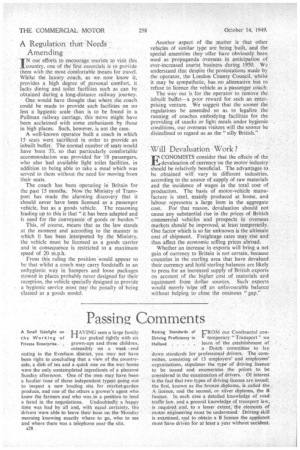A Regulation that Needs Amending I N our efforts to
Page 30

If you've noticed an error in this article please click here to report it so we can fix it.
encourage_ tourists to visit this country, one of the first essentials is to provide them with the most comfortable means for travel. Whilst the luxury coach, as we now know it, provides a high degree of personal comfort, it lacks dining and toilet facilities such as can be obtained during a long-distance railway journey.
One would have thought that where the coach could be made to provide such facilities on no less a hygienic scale than is to be found in a Pullman railway carriage, this move might have been acclaimed with some enthusiasm by those in high places. Such, however, is not the case.
A well-known operator built a coach in which 15 seats were sacrificed in order to provide an inbuilt buffet. The normal number of seats would have been 33, so that particularly comfortable accommodation was provided for 18 passengers. who also had available light toilet facilities, in addition to being able to take a meal which was served to them without the need for moving from their seats.
The coach has been operating in Britain for the past 15 months. Now the Ministry of Transport has made the alarming discovery that it should never have been licensed as a passenger vehicle, but as a goods vehicle. The reasoning leading up to this is that "it has been adapted and is used for the conveyance of goods or burden " This, of course, means that as the law stands at the moment and according to •the manner in which it has been interpreted by the Ministry, the vehicle must be licensed as a goods carrier and in consequence is restricted to a maximum speed of 20 m.p.h.
From this ruling the position would appear to be that whilst a coach may carry foodstuffs in an unhygienic way in hampers and loose packages stowed in places probably never designed for their reception, the vehicle specially designed to provide a hygienic service must pay the penalty of being classed as a goods model. Another aspect of the matter is that other vehicles of similar type are being built, and the special amenities they offer have obviously been used as propaganda overseas in anticipation of ever-increased tourist business during 1950; We understand that despite the protestations made by the operator, the London County Council, whilst it may be sympathetic, has no alternative but to refuse to licence the vehicle as a passenger coach.
The way out is for the operator to remove thefl inbuilt buffet—a poor reward for such an enterprising venture. We suggeSt that the sooner the regulations be amended so as to legalize the running of coaches embodying facilities for the providing of snacks or light meals under hygienic conditions, our overseas visitors will the sooner be disinclined to regard us as the "silly British."




























































































